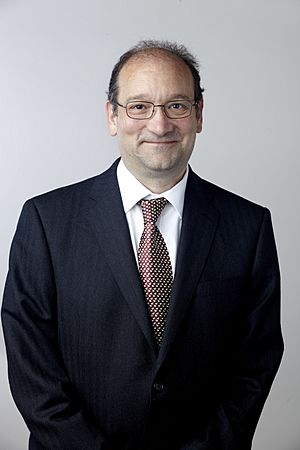Julian Parkhill facts for kids
Quick facts for kids
Julian Parkhill
FRS FMedSci
|
|
|---|---|

Parkhill in 2015
|
|
| Born | 23 September 1964 |
| Education | Westcliff High School for Boys |
| Alma mater |
|
| Known for | ARTEMIS |
| Scientific career | |
| Fields | |
| Institutions | |
| Thesis | Regulation of transcription of the mercury resistance operon of Tn501 (1991) |
Julian Parkhill was born in 1964. He is a Professor at the University of Cambridge, where he studies how bacteria change over time. Before this, he led a team at the Wellcome Sanger Institute that focused on understanding the genes of germs.
Contents
Julian Parkhill's Education
Julian Parkhill went to Westcliff High School for Boys. He then studied at the University of Birmingham and the University of Bristol. In 1991, he earned his PhD from the University of Bristol. His research looked at how certain genes in bacteria help them resist mercury.
Career and Research
Professor Parkhill uses special methods to study tiny living things called pathogens. Pathogens are germs that can make people sick. He uses DNA sequencing to look at their DNA, which is like their instruction manual. This helps him understand how different types of germs cause illness.
His research also explores how germs spread and how they have changed over time. He wants to know how germs interact with the bodies they infect. His work has been supported by important science organizations like the Wellcome Trust.
Studying Germs and Diseases
Professor Parkhill's team has studied the DNA of many important bacteria. These include germs that cause serious diseases like tuberculosis and plague. They also studied germs that cause typhoid fever, whooping cough, and leprosy.
His team has also looked at germs that cause infections in hospitals. These include Clostridioides difficile and MRSA. They also studied germs found in food, such as Campylobacter jejuni and Salmonella Typhimurium.
Their current work uses advanced DNA sequencing to study many different types of bacteria. They look at how changes in a germ's DNA are linked to how diseases spread. They also study how germs become resistant to medicines.
Professor Parkhill and his team work with doctors and scientists around the world. They help bring new DNA study methods into hospitals and public health efforts. This helps doctors understand and fight diseases better.
Awards and Recognition
Julian Parkhill has received several important awards for his work.
- In 2009, he became a Fellow of the Academy of Medical Sciences. This means he was recognized as a top expert in medical science.
- In 2012, he was named a Fellow of the American Academy of Microbiology. This award recognized his important contributions to the study of tiny living things.
In 2014, Professor Parkhill was elected a Fellow of the Royal Society. This is a very high honor for scientists in the United Kingdom. His election recognized his major role in mapping the DNA of many key bacteria that cause diseases. These include Mycobacterium tuberculosis (which causes tuberculosis) and Yersinia pestis (which causes plague).
His work has helped scientists understand how bacterial DNA changes. It also showed how different types of bacteria can exist even within the same group. Professor Parkhill has also helped create tools to understand and see DNA data. These tools are shared freely with scientists worldwide.

